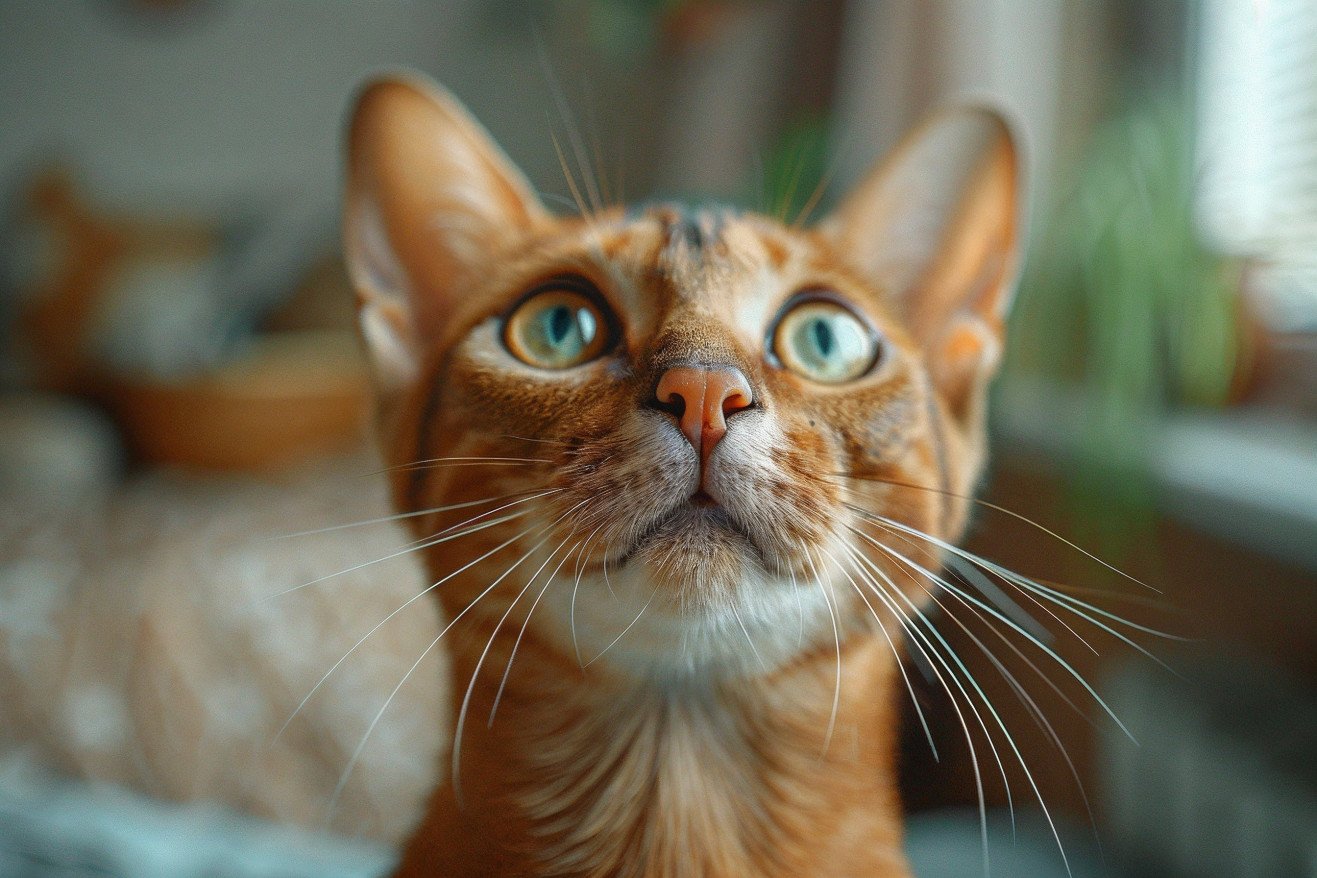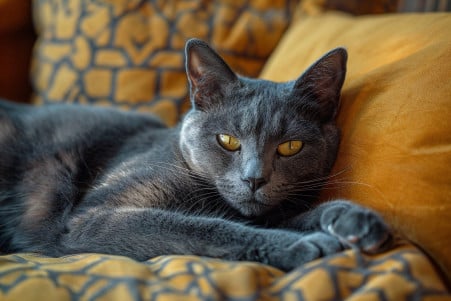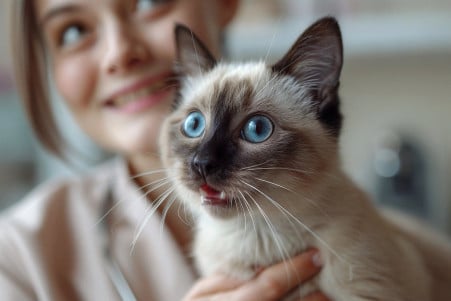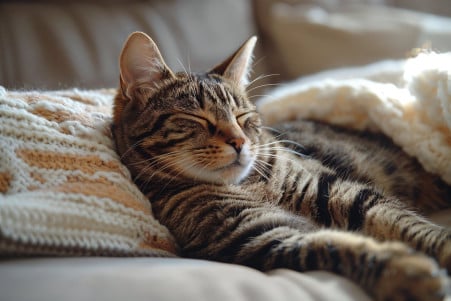Why Doesn't My Cat Meow? Understanding Feline Vocalization
23 March 2024 • Updated 23 March 2024

If your cat doesn't meow, or doesn't meow very often, there are a number of potential explanations, including breed differences, age, and the specific dynamics of your cat's relationships with other pets and people. Meowing is a form of vocalization that cats use almost exclusively to communicate with humans. While kittens meow to their mothers to get their attention, adult cats tend to meow much less, using the sound to communicate with their human families and as a greeting call.
This article will explore the findings of recent research studies by animal behaviorists and veterinarians that have looked into the reasons why a cat might not meow. These studies have shed light on a number of topics, including feline vocalization patterns, the ways cats communicate with humans versus other cats, and the physical and psychological issues that may be associated with a lack of meowing.
By learning about the science behind why some cats meow less than others, you can come to better understand and appreciate your cat's unique ways of communicating.
Why doesn't my cat meow?
How Breed and Personality Impact Cat Meowing
Breed and personality are two factors that can have a big impact on a cat's tendency to meow. For example, breeds like the Siamese, Oriental Shorthair, Maine Coon, and Bengal cats have been bred to be more vocal and chatty over time. This means that their meowing is likely tied to their history as a companion animal or a hunting cat.
That said, breed isn't the only factor that determines how much a cat meows. According to Best Friends Animal Society, a cat's personality, including how shy, confident, or independent they are, can also determine how often they meow. For example, a shy cat may not meow to get attention, while a confident cat may meow until they get what they want.
Knowing your cat's breed and personality can help you understand why they meow the way they do. Some cats may be naturally quiet, while others may be more genetically predisposed to meow. By understanding these factors, you can make sure you're meeting your cat's needs and helping them manage their meowing in a healthy way.
Life Stages: How Meowing Changes Over Time
Cats' meowing changes as they move through life stages. The ASPCA explains that kittens meow to let their mothers know they need something, like if they're cold or hungry. However, meowing tends to decrease as cats get older and rely more on body language and scent to communicate with other cats.
That said, senior cats may meow more for a variety of reasons. According to Embrace Pet Insurance, cognitive changes, sensory deficits, and medical conditions such as hyperthyroidism, hypertension, and brain tumors can all lead to increased vocalization in older cats. Meanwhile, PetMD points out that cats with feline cognitive dysfunction, which is similar to Alzheimer's in humans, may meow more as a result of the condition.
Knowing what's typical for cats at different life stages can help cat parents recognize when there may be a problem, especially in senior cats. Regular veterinary care is important to make sure that changes in meowing and other vocalizations aren't a sign of an underlying medical issue that needs to be addressed.
Medical Issues: When a Lack of Meowing May Be Cause for Concern
If your cat has suddenly stopped meowing or has become quieter, it could be a sign of an underlying medical issue. According to Mooresville Vet, some of the most common conditions that can affect a cat’s ability to meow are upper respiratory infections, laryngitis, thyroid issues, and neurological problems. Other potential causes include growths, foreign bodies, injuries, or paralysis of the vocal cords or larynx.
In addition to these issues, PetMD says that if you notice your cat coughing, having trouble breathing, or experiencing changes in their appetite or behavior, you should take them to the vet. BetterVet adds that treatment for cat laryngitis can include medications to treat infections and reduce inflammation, and in some cases, surgery to remove foreign bodies. However, if the underlying cause is treated early, it can help ensure that your cat’s meowing returns to normal.
Environmental Factors and Stress: How Stress Affects Cat Meowing
Environmental changes like moving or introducing a new pet can be very stressful for cats and can change their meowing patterns. According to Comfort Zone, cats may meow more or less in response to stress, schedule changes, and feeling overwhelmed.
To help cats feel more comfortable and meow more naturally, it's important to provide a stable, enriched environment that includes familiar scents, toys, and hiding places. PawTracks explains that cats may "stay quiet out of fear" when they experience big life changes like moving or when a new pet is introduced to the home. In addition, making sure cats have enough mental and physical stimulation through play and interactive toys can help prevent excessive meowing due to boredom, as explained by Maddie's Fund.
By making sure that cats feel safe and secure and that their environment is enriched, cat parents can help their cats get back to their normal, comfortable meowing patterns. A stable, enriched environment is important for helping cats feel comfortable communicating in the way that comes most naturally to them.
How to Get Your Cat to Meow More
If you want to train your cat to meow more, there are a few things you can do to encourage this behavior. According to CattleDog Publishing, the first step is to reward the behavior you want, which in this case would be silence. At the same time, you need to make sure you're not rewarding the behavior you don't want, which is your cat's meowing. This means that you need to be patient and only give your cat attention when they're not meowing.
wikiHow also recommends learning to understand the different sounds your cat makes and what they mean. In addition, you can encourage your cat to meow more by spending more time with them, including playing and talking to them. According to WebMD, cats are more likely to meow when they want attention if they're tired.
That said, it's important to remember that cats are individuals and that you should never try to force your cat to meow more than they want to. Some cats are naturally quieter than others, and you should respect your cat's natural communication style.
Understanding Silent Meows and Other Feline Communication Styles
Wild cats only meow as kittens. Other vocalizations like trills, growls, purrs, yowling, hissing, etc. are more common in adults but happen only to communicate particular things, such as" hi there" or "I'm in heat" in Megara's case. Cats find body language and scent to be much more attractive when communicating with other adults because these methods are less likely to attract predators.
We've come to expect adult cats to meow because a great many of them do when they've been raised by humans. Most of us humans are very responsive to sounds, so meows generally work. When we respond to a sound a cat makes, we basically train them to repeat that sound to get our attention, as a Cornell University study on how cats meow to communicate with humans has shown.
If a normally vocal cat suddenly falls quiet for extended periods of time, some concern might be warranted, especially if the pet seems lethargic or depressed, as The Spruce Pets explains. However, in most cases, a cat's silence is simply a choice or an expression of its nature and isn't anything to worry about.
As Pets Stack Exchange notes, the most common reason for a cat's silent meow is that their vocal cords are deformed, so they have no "voice." Illness or accident can also cause problems, particularly if there's nerve damage.
Final Thoughts: Delving into Feline Vocalization
A cat's meowing behavior is influenced by various factors, including breed, personality, age, health, and environmental conditions. While meowing is a way for cats to communicate with humans, it is not their primary form of communication with other felines. Sudden changes in a cat's meowing patterns or loss of voice can sometimes indicate an underlying health issue that requires veterinary attention.
Understanding and respecting a cat's individual communication preferences is essential for building a strong bond and ensuring their well-being. Whether vocal or silent, cats have unique ways of expressing themselves, and owners should appreciate and adapt to their feline friend's communication style.


